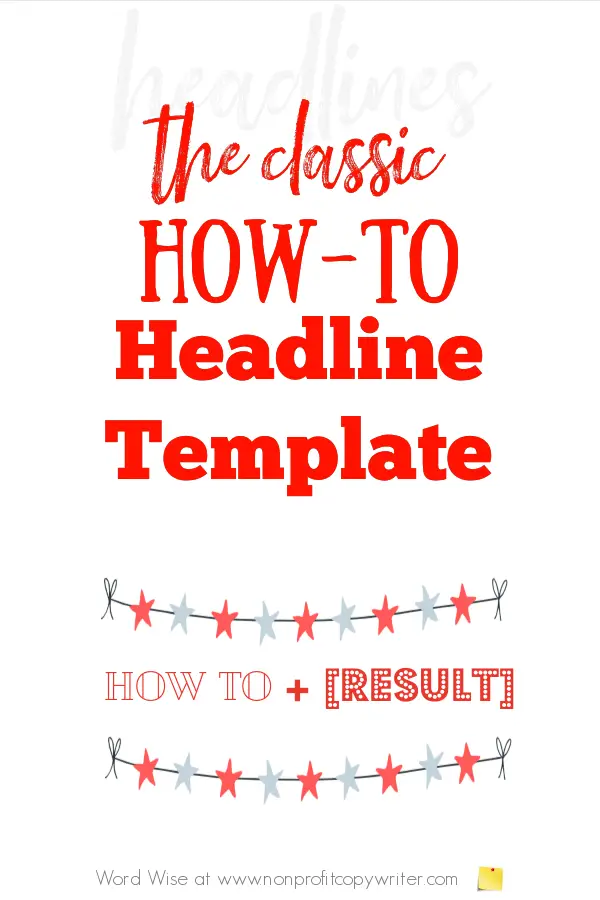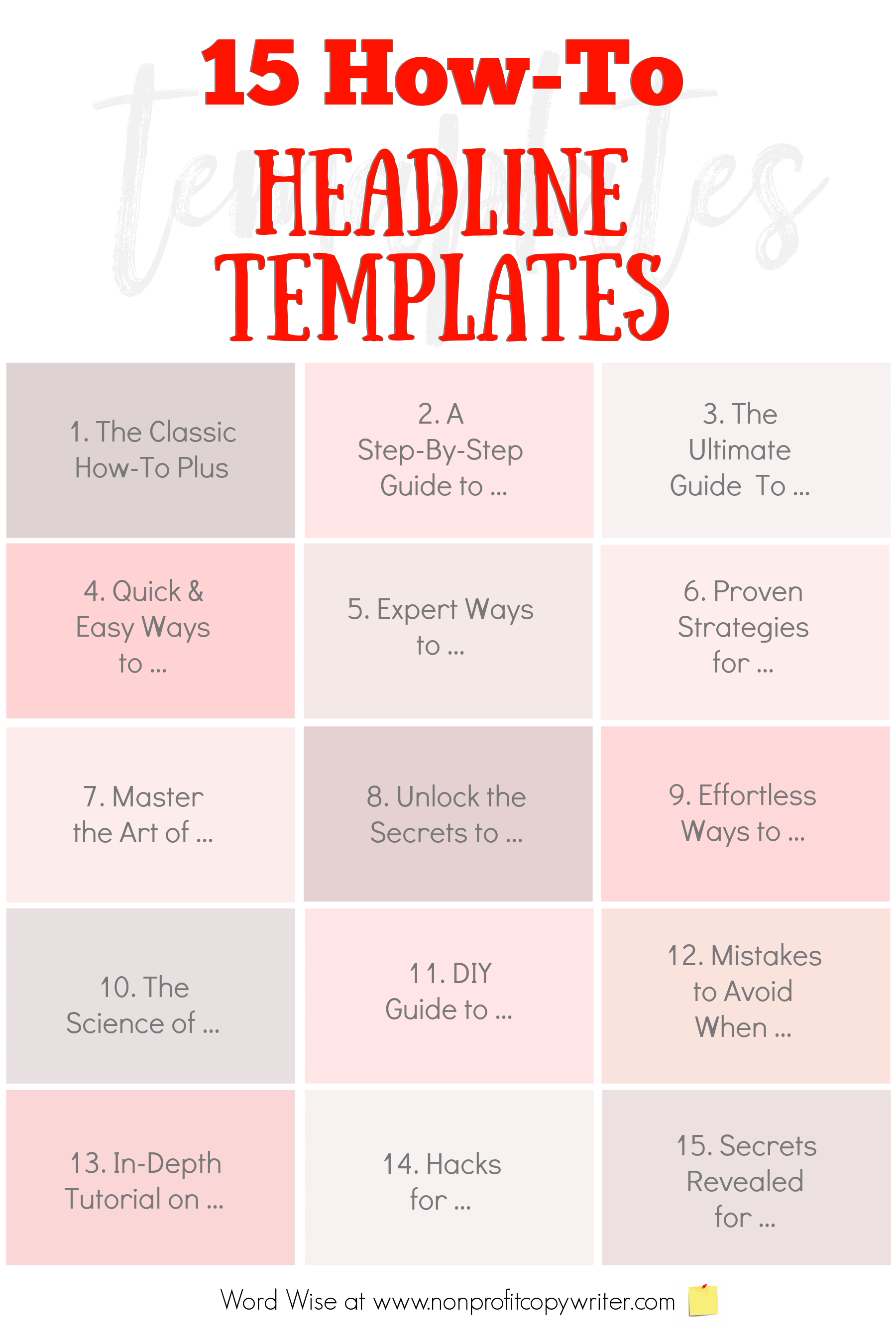Save Time: Get 5 Simple Writing Tips
you can put to use in 10 minutes
How To Write How-To Headlines That Pull in More Readers
Award-winning writer Kathy Widenhouse has helped hundreds of nonprofits and writers produce successful content , with 750K+ views for her writing tutorials. She is the author of 9 books. See more of Kathy’s content here.
Updated 2.13.25
How To headlines: their popularity is nothing new. The formula has been touted as one of the best-performing of all time by master adman John Caples (1900–1990) in Tested Advertising Methods. In fact, “Many advertising writers claim if you begin with the words ‘how to,’ you can’t write a bad headline,” says America’s copywriter, Bob Bly. You see it so often that “How To” has been recorded top three most popular phrases used in viral headlines.
And for good reason. How-to headlines make a promise that’s crystal clear. You’re guaranteed a specific result — you’ll acquire knowledge or skill simply by reading the content that follows.
So to write a good headline, you simply need to slap “how to” on the front, right? Not so fast. The formula’s acclaim is a double-edged sword because everybody uses it. To write a how-to headline that earns opens and clicks, you need a leg up.
But gaining the advantage is not so hard.
How to pull in more readers with a how to headline
The classic how-to headline template looks like this:
How to + [Result]
Example: “How to Make a Pie Crust”
Like any other how-to headline, this example shows usefulness.
Yet it’s not urgent, unique, or ultra-specific. In fact, it’s no different than hundreds or even thousands of other food blog headlines. The last time I did a search for “how to make a pie crust,” there were 122,000,000 results.
But with one little tweak, it’s easy to make your how-to headline stand out.
Simply add an additional benefit.
In other words, add a tiny dose of the urgent, unique, or specific. Let your headline declare how to achieve a result quicker … for less cost … for a special purpose … in a detailed way.
Don’t simply write, “How to Make a Pie Crust.” Instead, write …
- How to Make a Pie Crust in 5 Minutes Flat
- How to Make a Tangy Pie Crust for Lemon Chiffon Pie
- How to Make Pie Crust without Oil, Butter, or Lard
Each of these headlines has a bit of a twist. That extra smidgeon of detail offers clarity and gives your headline a distinct advantage over others. “One study discovered that the more clarity the headline had, the more appealing it was,” says SEO and internet guru Neil Patel.
You pull in readers with a how to headline. Anybody can. But you’ll pull in even more readers when you add this little zing — this extra benefit.
Use these 15 headline templates to write winning how to headlines
You can convert the classic how-to headline by tacking on a benefit at the end (making it the “Classic How-To Plus.”) Each of the additional how-to headline templates listed here includes an extra zinger, too. You’ll see that I’ve spelled out these additional benefits to help you understand how to use the templates. All told, you’ve got 15 headline template options to help you write your next how-to.
Once you write a few samples, step back. Can you identify added urgency, uniqueness, or specificity in your how-to headline? If so — well, you’ve got a winner.
1. The Classic How-To Plus
“How to + [Result] + [How]”
Example: “How to Make a Pie Crust with Just 4 Ingredients”
Extra benefit: convenience.
Example: “How to Make a Pie Crust for Less Than 50 Cents”
Extra benefit: cost savings.
“How to + [Result] + [What For]”
Example: “How to Make a Pie Crust that Your Mother-In-Law Raves About”
Extra benefit: human acceptance.
Example: “How to Make a No-Fail Pie Crust”
Extra benefit: a guarantee of success.
2. A Step-by-Step Guide to [Result]
Example: “A Step-by-Step Guide to Making a Homemade Pie Crust”
Extra benefit: practicality. You get each individual step spelled out for you.
3. The Ultimate Guide to [Result]
Example: “The Ultimate Guide to Making Homemade Pie Crust”
Extra benefit: completeness and superiority. You’re going to get all the details, twists, turns, and potential pitfalls in this how-to.
4. Quick and Easy Ways to [Result]
Example: “3 Quick and Easy Ways to Make a Pie Crust”
Extra benefit: Convenience. The content is going to give you a specific number of ways to make a pie crust — three, to be exact. And further, those methods are going to be fast and simple.
5. Expert Tips on [Result]
Example: “2 Expert Tips on Making a Pie Crust”
Extra benefit: authority. The number at the beginning offers specificity. And the how-to tips you’ll learn aren’t from amateur or wannabe bakers. You’ll hear from pros who know what they’re doing.
6. Proven Strategies for [Result]
Example: “Proven Strategies for Making a Pie Crust”
Extra benefit: assurance. The information presented here is tried and tested. This isn’t a how-to that’s based on theory. It’s been used in kitchens over and over to churn out flakey piecrusts for picky dessert aficionados.
7. Master the Art of [Result]
Example: “Master the Art of Making a Pie Crust”
Extra benefit: confidence. This is not a one-and-done affair that allows you to just get by. You’re going to read this content and acquire a new skill that you can leverage not just as a beginner but beyond. And when you’re done … well, you won’t be a newbie any longer.
Get your FREE copy of the checklist here.
8. Unlock the Secrets to [Result]
Example: “Unlock the Secrets to Making a Homemade Pie Crust”
Extra benefit: discovery. The promised content offers clarity, innovation, and breakthroughs.
9. Effortless Ways to [Result]
Example: “6 Effortless Ways to Make a Pie Crust”
Extra benefit: simplicity. In the eyes of today’s readers, ease is a big advantage.
10. The Science of [Result]
Example: “The Science of Making a Pie Crust”
Extra benefit: knowledge. Why should you use a fork to mix pie crust ingredients? What happens to the gluten when you mix the ingredients together? How do the molecular structures of oil versus lard versus butter make a difference in the pie crust’s texture and taste?
11. DIY Guide to [Result]
Example: “DIY Guide to Making Homemade Pie Crust”
Extra benefit: empowerment. This how-to headline assumes that not everyone knows how to do it yourself. It details how the homemade reality is different than the purchased version using very detailed steps for the novice.
12. Mistakes to Avoid When [Result]
Example: “3 Mistakes to Avoid When Making a Pie Crust”
Extra benefits: pride; inconvenience. No one likes to look foolish. Nor do users like to waste time. Rather than explain what to do, this how-to explains what not to do.
13. In-Depth Tutorial on [Result]
Example: “In-Depth Tutorial on Making a Pie Crust”
Extra benefit: thoroughness. This how-to dives deep. It features a table of contents, anchor links, videos, and images.
14. Hacks for [Results]
Example: “5 Hacks for Making a Perfect Pie Crust”
Extra benefits: Convenience; one-upmanship. Along with the assurance that you’ll have at least 5 options to try, this how-to headline template offers insider tips and tricks to make the result faster, simpler, and easier to achieve.
15. Secrets Revealed for [Result]
Example: “Secrets Revealed for Making a Flakey Pie Crust”
Extra benefit: discovery. Like #8, this headline offers insider information. Why do some pie crusts crumble perfectly on the palate and others require a chainsaw? The content goes further than a simple slap-and-dash approach but provides explanations for making a pie crust that’s delectable.
Extra writing tips for how-to headlines
- Use numbers. You’ll engage more readers. Plus, numbers in headlines give the reader a clear idea of what to expect and give you, the writer, a ready-made writing outline to follow. And when it comes to the 4Us in headlines — useful, urgent, unique, ultra-specific — you can’t get more specific than a particular number.
- Include keywords. Use your content’s main term or phrase in your headline, preferably within the first three words. This allows search engines to recognize your topic faster.
- Keep it short. The ideal headline length varies from project to project. However, search engines display the first 50–60 characters of a title tag. Don’t let extra words cut off your headline.
What you MUST remember about writing how-to headlines
In all your excitement of offering an additional benefit for your reader — along with the obvious usefulness that’s a given with a how-to headline — be sure you deliver on your extra benefit’s promise.
For instance, let’s say your headline reads, “6 Effortless Ways to Make Pie Crust.” Your reader clicks on the link, eager to see how she can churn out a culinary feat with ease. Yet the content that follows gives 27 complicated tasks she must complete.
Where’s the extra benefit — the effortless ways she can mix and roll? They’re not there. You’ve misled the reader.
You always pull in more readers when you make a promise in your how-to headline. It’s the nature of the beast. But make a promise with an extra bit of pizzazz — and then keep it — and you’ll earn true fans.
More Headline Writing Tips
Try these 5 proven headline formulas ...
Top 12 Headline Templates and Why They Work ...
Write Great Headlines With One Simple Formula ...
5-point checklist to use when you write a headline ...
When Do Question Headlines Work?
Writing Better Headlines: Simple As 3 + 3 ...
How to Redeem a Bad Headline (So Readers Keep Reading) ...
Does your headline do its job?
10 words to use when writing headlines ...
See more on our Tips for Writing Headlines Pinterest Board...
Return from How To Write How To Headlines to Nonprofit Copywriter home
As an Amazon Associate I earn from qualifying purchases.
Share This Page

Named to 2022 Writer's Digest list
BEST GENRE/NICHE WRITING WEBSITE


Stop Wasting Time!

Grab your exclusive FREE guide, "5 Simple Writing Tips You Can Put to Use in 10 Minutes or Less"













